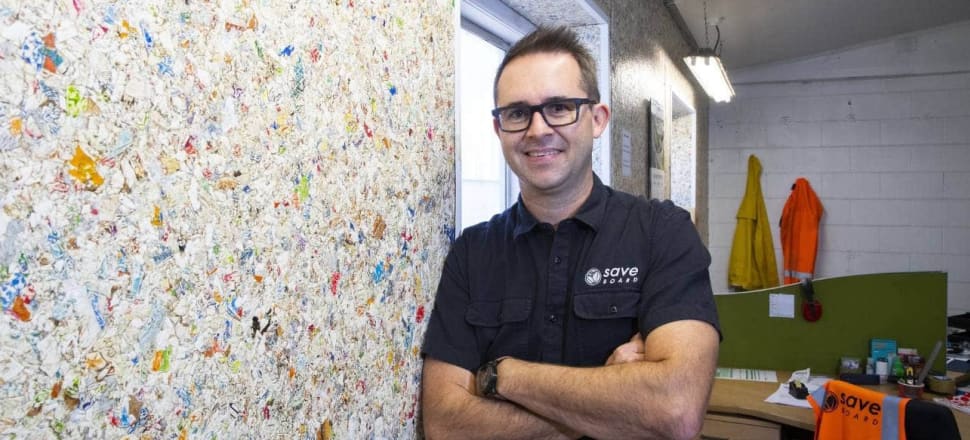
Greater funding overseas has Upcycled wallboard business Saveboard expanding rapidly into Australia
Paul Charteris was working to find a solution for Fonterra’s packaging waste when he stumbled on a building product solution in the US that was “too good not to do”.
A plasterboard substitute was obviously a bit far from Fonterra’s bread and butter, setting Charteris off on a half-decade mission to fund and bring the technology to the bottom of the world.
Saveboard’s technology, licensed for the Asia Pacific region from its pioneers in America, fuses a combination of soft plastics (including from supermarket collection points) and paper/cardboard (including scratchies and beverage cartons).
Each board it makes stops 500 used beverage cartons from going to landfill and each of its production lines prevents 4,000,000kg of soft plastics and fibre from going to the dump each year.
“Ultimately, we’re not solving the worldwide problem of waste generation, but we’re taking waste that’s already available in the market that has a single use and is going to landfill and upcycling it into a direct substitution for commonly used building materials,” said Charteris, the chief executive and co-founder of the business.
Offcuts and old Saveboard products can be put back through the system to renew them, creating a circular economy.
Around half of its customers currently send offcuts back to Saveboard.
READ MORE: *Cars, fridges, the waste conundrum, and the circular economy *‘The more you know about waste, the less you sleep at night’ *Council grants to snuff out fire extinguisher waste
Auckland waste firm Green Gorilla does break down plasterboard to sell as garden-friendly gypsum, but New Zealand doesn’t have a true circular option for it.
Saveboard’s end product (which comes in a natural or paper-covered form) is one of five approved substitutes for plasterboard in New Zealand and bracing tests have shown they outperform most traditional building products.
Its products, even the traditional papered boards, have a rougher texture, but this can be treated as a feature or filled with a thin layer of plaster.
Not relying on water or fossil fuels (outside of what is used in the energy grid), it has a better environmental footprint than plasterboard, which relies on Gypsum mined overseas and shipped to New Zealand.
Saveboard still requires local road transport, but Charteris said it worked out to around 75 percent of the footprint of standard plasterboard.
Expansion
The company recently opened a second plant over in Sydney and has plans to open a third and fourth across the Tasman.
The growth in Australia is down to securing grant funding in Australia, something it had failed to do back home.
Its first production facility opened in Hamilton in June 2022, funded by early backing in the form of a $1.1 million loan (later converted to a 22 percent shareholding) from NZX-listed Freightways.
Freightways, which owns courier, tech and document storage and destruction businesses, followed this up with a $1.6m investment (taking its stake to 35.65 percent) towards the Australian market.
“When we were putting together the New Zealand business we applied for any funding that we thought we could qualify for, including the Waste Minimisation Fund, the Ākina Foundation, even different impact investment funds around New Zealand and ultimately we were unsuccessful.”
Charteris believed this strengthened the business case as it had to stand on its own two feet without benefitting from subsidised investment.
It ultimately had more success applying for grants in Australia - receiving A$1.74m from the New South Wales government towards its Sydney facility.
The business also received funding from the governments of Victoria and Queensland to open plants in those states.
“We've ultimately been successful in all the funding we've applied for in Australia. Look, it's a bigger country, and they've got all sorts of funds available for this type [of thing]. I say that they're ahead of New Zealand in terms of investing in sustainable infrastructure.
“Initially I thought it was going to be the reverse, but actually, I'd say they're ahead of the game compared to New Zealand.”
Saveboard is in active conversations to start up in other Asia Pacific countries and wants to play a bigger part in creating and promoting a circular economy.
“We’re not the silver bullet to solve everything, but we're a piece of the puzzle and if you had 100 different types of businesses like ours looking at different waste streams, then we'd be in a whole lot better place.”







